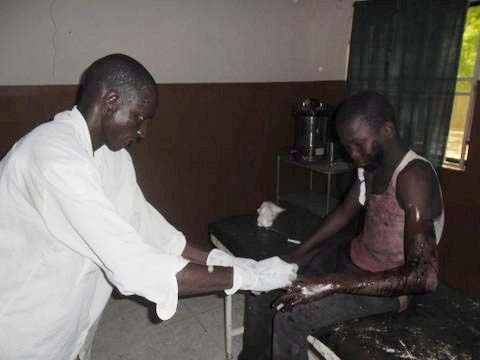30 killed in school attack in northeast Nigeria
POTISKUM, Nigeria — Islamic militants attacked a boarding school before dawn Saturday, dousing a dormitory in fuel and lighting it ablaze as students slept, survivors said. At least 30 people were killed in the deadliest attack yet on schools in Nigeria’s embattled northeast.
Authorities blamed the violence on Boko Haram, a radical group whose name means “Western education is sacrilege.” The militants have been behind a series of recent attacks on schools in the region, including one in which gunmen opened fire on children taking exams in a classroom.
“We were sleeping when we heard gunshots. When I woke up, someone was pointing a gun at me,” Musa Hassan, 15, told The Associated Press of the assault on Government Secondary School in Mamudo village in Yobe state.
He put his arm up in defense, and suffered a gunshot that blew off all four fingers on his right hand, the one he uses to write. His life was spared when the militants moved on after shooting him.
Hassan recalled how the gunmen came armed with jerry cans of fuel that they used to torch the school’s administrative block and one of the dormitories.
“They burned the children alive,” he said, the horror showing in his wide eyes.
He and teachers at the morgue said dozens of children from the 1,200-student school escaped into the bush but have not been seen since.
On Saturday, at the morgue of Potiskum General Hospital, a few miles (kilometers) from the scene of the attack, parents screamed in anguish as they attempted to identify the victims, many charred beyond recognition. Some parents do not know if their children survived or died.
Farmer Malam Abdullahi found the bodies of two of his sons, a 10-year-old shot in the back as he apparently tried to run away, and a 12-year-old shot in the chest.
“The gunmen are attacking schools and there is no protection for students despite all the soldiers,” he said as he wept over the two corpses. He said he is withdrawing his three remaining sons from another school.
Islamic militants from Boko Haram and breakaway groups have killed more than 1,600 civilians in suicide bombings and other attacks since 2010, according to an Associated Press count.
President Goodluck Jonathan declared a state of emergency May 14 and deployed thousands of troops to halt the insurgency, acknowledging that militants had taken control of some towns and villages.
Saturday’s attack killed 29 students and English teacher Mohammed Musa, who was shot in the chest, according to another teacher, Ibrahim Abdu.
Police officers who arrived after the gunmen left and transported the bodies to the hospital confirmed at least 30 people were killed.
Boko Haram, whose stronghold is 230 kilometers (143 miles) away in Maiduguri city, capital of neighboring Borno state, has been behind scores of attacks on schools in the past year.
On Thursday, gunmen went to the home of a primary school headmaster and gunned down his entire family. Witnesses said they attacked at 7 a.m. as the owner of the private Godiya Nursery and Primary School was preparing to leave his home in the town of Biu, about 180 kilometers (112 miles) from Maiduguri.
Resident Anjikwi Bala told the AP that Hassan Godiya, his wife and four children all were killed.
He said the assassins, suspected Boko Haram fighters, got away.
People from Yobe state this week appealed for the military to restore cell phone service in the area under a state of emergency, saying it could have helped avert a June 16 attack on a school that the military said killed seven students, two teachers, two soldiers and two extremists in Damaturu, capital of Yobe state.
Residents told the AP that they had noticed suspicious movements of strangers and could have alerted soldiers and police, if their cell phones were working. Instead, the military said they were involved in a five-hour shootout before the militants fled.
A day later, June 17, extremists fired on students sitting at their desks as they were writing exams in Maiduguri, killing at least nine pupils.
Borno state officials say more than 20,000 people have fled to Cameroon in recent weeks amid the violence.
The military has claimed success in regaining control of the states of Adamawa, Borno and Yobe. However, the area covers some 155,000 square kilometers (60,000 square miles) or one-sixth of the sprawling country. The rebellion poses the biggest threat in years to security in Africa’s biggest oil producer.
Soldiers say they have killed and arrested hundreds of fighters. But the crackdown, including attacks with fighter jets and helicopter gunships on militant camps, appears to have driven the extremists into rocky mountains with caves, from which they emerge to attack schools and markets.
The militants have increasingly targeted civilians, including health workers on vaccination campaigns, traders, teachers and government workers.
Farmers have been driven from their land by the extremists and by military roadblocks, raising the specter of a food shortage to add to the woes of a people already hampered by a dusk-to-dawn curfew and the military’s shutdown of cell phone service and ban on using satellite telephones.
———
Faul reported from Lagos, Nigeria. THE ASSOCIATED PRESS Haruna Umar in Maiduguri, Nigeria, contributed to this report.






















